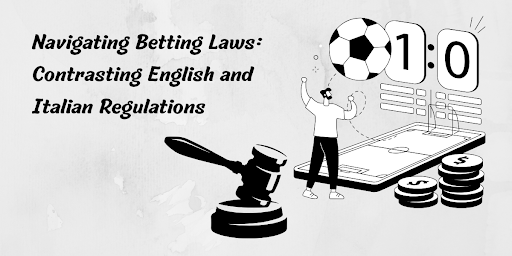Navigating Betting

Can you imagine our world without betting? We are confident that it wouldn’t have been the same. This entertainment has been in demand for centuries; it’s still around and is experiencing an unprecedented boom in 2024. Since the industry has become more popular globally, it requires more regulations. Multiple countries where the betting sector is well-developed have already launched legislation. Italy and England are among the states where betting is legal and regulated. Let’s learn more about this point and evaluate the main similarities and differences.
An Overview of Betting Regulations
The evolving betting landscape raised the need to create appropriate regulatory mechanisms to make the industry transparent and secure. Controlling authorities recommend leading the gambling business fairly and complying with the law. Ensuring that operators are honest with their customers and provide them with appropriate betting conditions is on the agenda for betting regulators. Authorities also track customers’ behaviours and offer particular limits to promote a responsible approach to this risky entertainment.
English Betting Regulations
The UK boasts one of the best-developed betting sectors on the continent, and the appearance of online sportsbooks transformed the industry, which called for more regulations within the country. The UK Gambling Commission is the main body controlling betting and casino activities. Online bookmakers are rapidly growing, and user engagement is also high. Players can explore numerous
english betting sites on siti-non-aams.bet and choose the best conditions to make their sports predictions in a safe and reliable environment. The main aspects of industry regulations in England include the following.
1. UKGC licencing is essential for platforms operating in the country legally. The authority controls the platform’s fairness, security measures, fraud prevention, etc.
2. Taxation: winnings are not taxable in England; operators pay a significant part of their income to the country’s budget. All sports betting companies must pay a 15% tax on their gross profits.
3. Permitted Bets: English punters can enjoy numerous betting markets, including more popular sports and niche disciplines.
4. Advertising gambling and betting is not prohibited in England, but operators must stick to numerous requirements, including avoiding targeting underage individuals and providing information about responsible gambling.
5. Consumer Protection rules in the UK oblige all its licensees to provide secure and fair conditions to betting enthusiasts. This concerns data protection and increasing awareness of responsible gambling.
All these aspects make the English betting market secure and reliable, engaging millions of users annually. UKGC regularly implements changes to make the sector more transparent and fair, affecting the well-being of the country’s population.
Italian Betting Regulations
Italy is another country where betting is widespread: approximately 35% of its residents prefer gambling or making sports predictions. Such a high user engagement raised the need for appropriate industry regulations. AAMS is the controlling body that monitors the sector and regularly launches updates.
1.
Licensing from AAMS ensures operator reliability and fairness. The latest amendment in the Italian gambling law increases certification fees up to €7 million, so the number of bookies in the state is predicted to be reduced significantly.
2. Taxation in Italy is more loyal than those in England, as operators must pay 4.5% of their revenue. Such conditions encourage bookmakers to enter the country’s market and provide legal services.
3. Permitted Bets: all betting markets are available to Italian risk seekers. However, local punters face restrictions on the amount of cash they can invest in online sportsbooks. In addition, bonuses are also limited to prevent irresponsible gambling.
4. Advertising
5. Italian gambling laws are among the strictest in the EU, as the regulatory body completely bans all industry advertisements. It’s also prohibited for bookmakers to form collaborations with sports teams.
6. Consumer Protection is the top priority for Italian authorities in 2024. AAMS implements all possible measures to ensure that gambling threats do not target the vulnerable population.
Many of the points above are similar to those in the UK, but Italy has stricter advertisement bans and requires bookies to pay more to obtain licencing.
Key Differences and Similarities
The two countries share similar approaches to betting regulations, highlighting the need for consumer protection and responsible gambling. Both England and Italy require bookmakers to acquire licensing from the UKGC, AAMS, or other authorities. However, certification from the Italian regulator will be more costly in 2025 and reach €7 million. Such a decision will decrease the number of betting companies in the country, while
UKGC licensing is more affordable.
Significant differences also touch on taxation – and here, conditions in the Italian market are more beneficial for bookmakers. England charges gambling companies up to 15% of their annual revenue, while sportsbooks in Italy must only pay 4.5%.
Consumer protection mechanisms are similar in both countries, as both initiate campaigns to increase customer awareness about betting risks and inform users of possible negative consequences. Italy is stricter regarding gambling advertisements, which are completely restricted in the state.
Final Insight
Betting activities are legal in England and Italy but have different approaches to industry regulations. The license fee for Italian bookies will be increased significantly, and entering the country’s gambling sector will be more complicated. On the other hand, bookmakers pay fewer taxes than those in England (4.5% vs 15%). The main differences in legislation mostly concern operators, while users can enjoy flexibility and a broad choice of betting markets in Italy and England. However, staying updated and following legitimate amendments is critical to ensure compliance with valid regulations.
